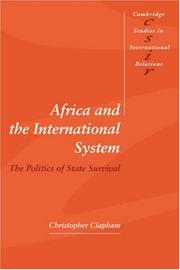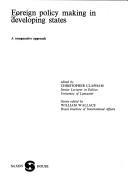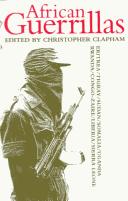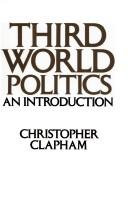| Listing 1 - 10 of 14 | << page >> |
Sort by
|

ISBN: 0521576687 052157207X 0511549822 9780521576680 9780511549823 9780521572071 Year: 1998 Volume: 50 Publisher: Cambridge: Cambridge university press,
Abstract | Keywords | Export | Availability | Bookmark
 Loading...
Loading...Choose an application
- Reference Manager
- EndNote
- RefWorks (Direct export to RefWorks)
African independence launched into international politics a group of the world's poorest, weakest, and most artificial states. How have such states managed to survive? To what extent is their survival now threatened? Christopher Clapham shows how an initially supportive international environment has - as a result partly of political and economic mismanagement within African states themselves, partly of global developments over which they had no control - become increasingly threatening to African rulers and the states over which they preside. The author also reveals how international conventions designed to uphold state sovereignty have often been appropriated and subverted by rulers to enhance their domestic control, and how African states have been undermined by guerrilla insurgencies and the use of international relations to serve essentially private ends. He shows how awkward, how ambiguous, how unsatisfactory, and often how tragic, has been the encounter between Africa and Western conceptions of statehood.
Soevereiniteit --- Souveraineté --- Sovereignty --- Self-determination, National --- Sovereignty. --- Droit des peuples à disposer d'eux-mêmes --- Africa --- Afrique --- Foreign relations --- Relations extérieures --- -Sovereignty --- #SBIB:327.4H71 --- #SBIB:AANKOOP --- State sovereignty (International relations) --- International law --- Political science --- Common heritage of mankind (International law) --- International relations --- National self-determination --- Nationalism --- Nation-state --- Nationalities, Principle of --- Derde wereld en wereldsysteem, internationale relaties --- Law and legislation --- Eastern Hemisphere --- -Self-determination, National --- Droit des peuples à disposer d'eux-mêmes --- Souveraineté --- Relations extérieures --- International relations. Foreign policy --- Internal politics --- 1960 --- -Self-determination [National ] --- Social Sciences --- Political Science --- Self-determination, National - Africa --- Africa - Foreign relations - 1960

ISBN: 056600173X 9780566001734 Year: 1979 Publisher: Farnborough (Hants): Saxon house,
Abstract | Keywords | Export | Availability | Bookmark
 Loading...
Loading...Choose an application
- Reference Manager
- EndNote
- RefWorks (Direct export to RefWorks)
Developing countries --- Foreign relations --- 327(1-772) --- Developing Countries --- #SBIB:327.1H10 --- #SBIB:327.4H63 --- Buitenlandse betrekkingen. Buitenlandse politiek. Internationale betrekkingen. Internationale politiek. Wereldpolitiek--Onontwikkelde, onderontwikkelde gebieden --- Foreign relations. --- Internationale betrekkingen: theorieën --- Derde wereld: ontwikkelingspolitiek, hervormingen (binnenlands, onderwijs-, gezondheidsbeleid e.a.) --- 327(1-772) Buitenlandse betrekkingen. Buitenlandse politiek. Internationale betrekkingen. Internationale politiek. Wereldpolitiek--Onontwikkelde, onderontwikkelde gebieden --- Developing countries - Foreign relations

ISBN: 0852558155 025321243X 0253334667 0852558163 Year: 1998 Publisher: Oxford : Currey,
Abstract | Keywords | Export | Availability | Bookmark
 Loading...
Loading...Choose an application
- Reference Manager
- EndNote
- RefWorks (Direct export to RefWorks)
Guerrillas --- Insurgency --- History --- Insurgent attacks --- Rebellions --- Civil war --- Political crimes and offenses --- Revolutions --- Government, Resistance to --- Internal security --- Bushwhackers --- Francs-tireurs --- Guerillas --- Maquis --- Partisans --- National liberation movements --- Africa, Eastern --- Liberia --- Sierra Leone --- Politics and government --- National movements --- Political sociology --- anno 1900-1999 --- Africa --- Africa [Eastern ] --- 1960 --- -Insurgency --- 20th century --- 1980 --- 1961 --- Africa, Eastern - Politics and government - 1960 --- -Sierra Leone - Politics and government - 1961 --- -Africa [Eastern ] --- -Guerrillas --- -Political sociology
Book
ISBN: 9780190680183 Year: 2017 Publisher: Oxford, UK : Oxford University Press,
Abstract | Keywords | Export | Availability | Bookmark
 Loading...
Loading...Choose an application
- Reference Manager
- EndNote
- RefWorks (Direct export to RefWorks)
Why is the Horn such a distinctive part of Africa ? This book, by one of the foremost scholars of the region, traces this question through its exceptional history and also probes the wildly divergent fates of the Horn's contemporary nation-states, despite the striking regional particularity inherited from the colonial past. The author explores how the Horn's peculiar topography gave rise to the Ethiopian empire, the sole African state not only to survive European colonialism, but also to participate in a colonial enterprise of its own. Its impact on its neighbours, present-day Djibouti, Eritrea, Somalia and Somaliland, created a region very different from that of post-colonial Africa. This dynamic has become all the more distinct since 1991, when Eritrea and Somaliland emerged from the break-up of both Ethiopia and Somalia. Yet this evolution has produced highly varied outcomes in the region's constituent countries, from state collapse (and deeply flawed reconstruction) in Somalia, through militarised isolation in Eritrea, to a still fragile 'developmental state' in Ethiopia. The tensions implicit in the process of state formation now drive the relationships between the once historically close nations of the Horn.
Book
ISBN: 052121095X 0521099803 0511563159 Year: 1976 Publisher: Cambridge : Cambridge University Press,
Abstract | Keywords | Export | Availability | Bookmark
 Loading...
Loading...Choose an application
- Reference Manager
- EndNote
- RefWorks (Direct export to RefWorks)
Very similar in some ways, but strikingly different in others, Sierra Leone and Liberia have an obvious appeal for comparative analysis. They share the legacy of foundation by immigrants of African descent and the juxtaposition of these with indigenous peoples, but within the contrasting institutional frameworks of settler independence and British colonialism. They have similar social and economic structures but sharply dissimilar political records: Liberia has long been regarded as the classic case of stability at the price of oligarchy, whereas Sierra Leone, after a period as West Africa's most successful two-party democracy, suffered a succession of military coups and by 1973 was effectively a single-party state. This study seeks to analyse and account for both similarities and differences, looking at the two countries' experience in the 1960s and early 1970s, not only in central politics but also at the local level and in economic policy.
Political sociology. --- Arts and Humanities --- History --- Liberia --- Sierra Leone --- Politics and government. --- Politics and government --- Mass political behavior --- Political behavior --- Political science --- Sociology --- Sociological aspects

ISBN: 9780299103347 029910334X Year: 1985 Publisher: Madison: University of Wisconsin press,
Abstract | Keywords | Export | Availability | Bookmark
 Loading...
Loading...Choose an application
- Reference Manager
- EndNote
- RefWorks (Direct export to RefWorks)

ISBN: 0192800418 9780192800411 Year: 1996 Publisher: Oxford: Oxford university press,
Abstract | Keywords | Export | Availability | Bookmark
 Loading...
Loading...Choose an application
- Reference Manager
- EndNote
- RefWorks (Direct export to RefWorks)
Book
ISBN: 0521334411 Year: 1988 Publisher: Cambridge : Cambridge university press,
Abstract | Keywords | Export | Availability | Bookmark
 Loading...
Loading...Choose an application
- Reference Manager
- EndNote
- RefWorks (Direct export to RefWorks)
Book
Year: 1996 Publisher: Cambridge New York Cambridge University Press
Abstract | Keywords | Export | Availability | Bookmark
 Loading...
Loading...Choose an application
- Reference Manager
- EndNote
- RefWorks (Direct export to RefWorks)
Book
Year: 1970 Publisher: New York (N.Y.) : Praeger,
Abstract | Keywords | Export | Availability | Bookmark
 Loading...
Loading...Choose an application
- Reference Manager
- EndNote
- RefWorks (Direct export to RefWorks)
| Listing 1 - 10 of 14 | << page >> |
Sort by
|

 Search
Search Feedback
Feedback About UniCat
About UniCat  Help
Help News
News